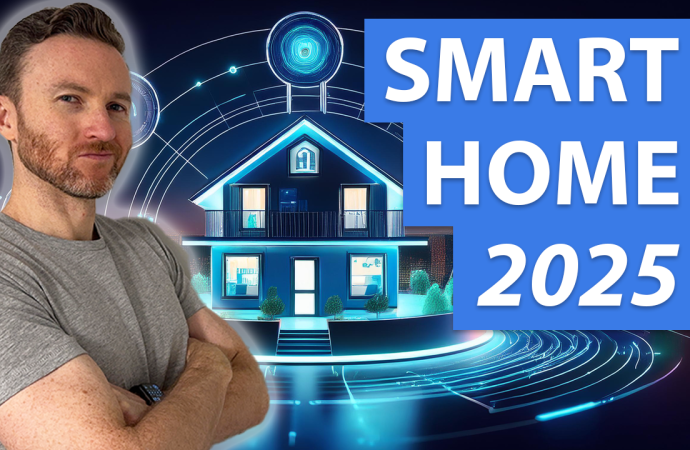Introduction In 2025, homebuyers are increasingly looking for homes with advanced features and smart home technology. Whether it’s for convenience, energy efficiency, or enhanced security, smart home integration is now a key selling point in real estate. As a homeowner or potential seller, you might be wondering how to make your home more attractive to
Introduction
In 2025, homebuyers are increasingly looking for homes with advanced features and smart home technology. Whether it’s for convenience, energy efficiency, or enhanced security, smart home integration is now a key selling point in real estate. As a homeowner or potential seller, you might be wondering how to make your home more attractive to buyers and increase its resale value.
The right home automation systems can elevate your property’s appeal and provide long-term benefits. In this guide, we’ll walk you through the best smart home devices and systems that can help boost your home’s value and make it stand out in today’s competitive market. By the end of this article, you’ll have a clear understanding of how to leverage smart home integration to improve your home resale value in 2025.
What Is Smart Home Integration?

Image by: Yandex.com
Smart home integration refers to the installation of smart home technology that connects various devices and systems in your home. These systems can be controlled remotely, usually through a smartphone app, voice commands, or automation settings.
A smart home includes devices like thermostats, lights, security cameras, and locks that work together seamlessly to enhance comfort, security, and energy efficiency. These devices are interconnected with mobile devices and can be controlled from anywhere, making them a convenient addition to any modern home. As technology advances, the smart home market is growing rapidly, and so is its impact on home resale value.
How Smart Home Integration Boosts Resale Value

Image by: Yandex.com
As we move into 2025, smart home integration is one of the top factors influencing resale value. Let’s look at some key reasons why smart home technology can increase the value of your home:
1. Enhanced Convenience
Homes with home automation systems offer unmatched convenience. Imagine controlling your home’s lights, thermostat, and security system with just a few taps on your phone. Potential buyers are attracted to this ease of use, especially as smart technology becomes more common. A smart home can significantly reduce the time and effort spent managing everyday tasks, making it a highly desirable feature for modern buyers.
2. Increased Energy Efficiency
Energy-efficient homes are a major selling point in the real estate market, and smart home devices can help homeowners save on energy costs. For example, a smart thermostat can learn your schedule and adjust the temperature automatically, reducing heating and cooling costs. Smart lighting systems, which can be dimmed or set to turn off when not needed, also help save energy. By reducing energy consumption, a smart home offers long-term savings, making it more attractive to eco-conscious buyers and increasing property value.
3. Improved Security Features
Home security is one of the primary concerns for homebuyers. With smart home integration, you can offer enhanced security features like smart cameras, doorbell cameras, and smart locks. These devices not only provide peace of mind but can also be monitored remotely. Buyers are willing to pay more for homes that provide added security, knowing that they can control and monitor their property from anywhere.
4. Future-Proofing Your Home
In 2025, smart technology is no longer a luxury but a necessity. As more people become accustomed to the benefits of smart home devices, they will expect them in new homes. By integrating these technologies now, you’re ensuring that your property stays competitive in the future real estate market. This future-proofing gives your home an edge and increases its long-term resale potential.
5. Increased Property Appeal
Homes with smart home integration tend to stand out in listings. Buyers are more likely to choose a home that already has these features rather than invest in adding them after purchase. Smart home technology appeals to buyers who appreciate the convenience, security, and energy efficiency it offers. By investing in the right smart home devices, you can significantly increase your home’s appeal and attract a wider range of potential buyers.
Key Smart Home Devices to Consider for Resale Value

Image by: Yandex.com
To truly boost your home’s resale value, you need to focus on the right smart home devices. Here are some of the top options to consider:
1. Smart Thermostats
A smart thermostat is a must-have for energy-conscious buyers. Popular brands like Nest and Ecobee learn your heating and cooling preferences and adjust the temperature automatically. This not only saves energy but also ensures that your home is always at the perfect temperature when you need it.
2. Smart Lighting Systems
Smart lighting systems, smart light bulbs such as Philips Hue or LIFX, offer the flexibility to control your home’s lights with your voice or smartphone. These systems can be set on timers or dimmed to create the perfect atmosphere. Energy-saving features like automatic turn-off or scheduling can also help reduce electricity bills.
3. Smart Security Systems
A comprehensive smart home security system can include smart cameras, motion sensors, video doorbells, smart plugs, and smart door locks. Companies like Ring and SimpliSafe offer affordable, easy-to-install systems that provide remote monitoring and control. With smart home security, potential buyers will appreciate the added peace of mind, knowing they can monitor their property at all times.
4. Smart Home Assistants
Smart home assistants, such as Amazon Echo or Google Nest Hub, can control all of your smart devices or smart speakers using voice commands. They offer convenience by allowing buyers to manage everything from lights to temperature, entertainment, and even shopping, all through simple voice interactions.
5. Smart Appliances
Smart appliances, including refrigerators, ovens, and washing machines, are becoming increasingly popular. These devices connect to the internet, allowing homeowners to control them remotely and receive notifications about their usage. As smart appliances become more common, they are a valuable addition to homes looking to increase resale value.
Future of Smart Home Integration in Real Estate

Image by: Yandex.com
Looking ahead, smart home technology will become even more integral to the real estate market. By 2025, more homes will feature advanced systems that allow for even greater control, like integrated AI that can learn the habits of the residents and adjust settings automatically. Voice-activated systems and even more energy-efficient appliances will become standard. As technology continues to improve, homes equipped with these features will have a competitive edge in the market. Real estate buyers will increasingly look for homes that offer high-tech convenience, safety, and energy efficiency, making smart home integration a must for anyone looking to increase their property’s resale value.
Comparative Table: Top Smart Home Devices for Boosting Resale Value
| Smart Device | Benefit | Recommended Brand |
|---|---|---|
| Smart Thermostat | Saves energy and maintains ideal temperature | Nest, Ecobee |
| Smart Lighting | Enhances atmosphere, energy-saving features | Philips Hue, LIFX |
| Smart Security System | Provides peace of mind, remote monitoring | Ring, SimpliSafe |
| Smart Home Assistant | Voice control for all smart devices | Amazon Echo, Google Nest Hub |
| Smart Appliances | Convenient and energy-efficient | Samsung, LG, Whirlpool |
Conclusion
In 2025, smart home integration is no longer just a luxury but a key factor in determining resale value. By incorporating smart home technology, homeowners can increase their property’s appeal, energy efficiency, and security, making it more attractive to potential buyers. The right smart home devices can not only improve your daily life but also provide a significant return on investment when it’s time to sell.
















